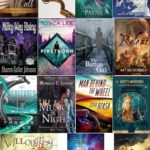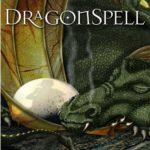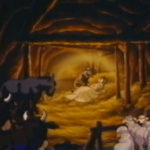Memorable Fathers
I decided that, in honor of Father’s Day, I would compile a list of memorable fathers in speculative fiction. Before I wrote a word – in fact,  as soon as I actually began to think about it – I encountered the main obstacle to such a list.
as soon as I actually began to think about it – I encountered the main obstacle to such a list.
Slim pickings.
This is, after all, the genre of the orphan, of emancipated minors and tragically separated families. Parents are usually cut out of the picture in short and ruthless order, whether by death or by somehow becoming separated from their children – either involuntarily or voluntarily, for noble or ignoble reasons. Memorable fathers are thus relatively few.
And yet still existent. Here is my list – and yes, we are counting talking animals.
King Triton from The Little Mermaid. Yes, I know: He was close-minded, bad-tempered, and destroyed Ariel’s awesome collection. But unlike the merely comic fathers of some Disney films, and the absent fathers of many other stories, he had the dignity of being a strong, crucial presence in the story. Not wholly positive, of course: Who can overlook his role in Ariel’s foolish bargain? But he mattered. And in taking his daughter’s place as Ursula’s slave, and later in giving her her happy ending, he proved not only vital but good.
Gaffer Gamgee from The Lord of the Rings. I wanted to do Elrond, as father of Arwen and foster-father of Aragorn (raised apart from Arwen, to prevent oddness). But that draws too heavily from the appendices, rather than the story proper. I also thought of Denethor, but that was depressing, and I frankly don’t feel like talking about it. So: Gaffer Gamgee. Important to the story? No. But unique and certainly memorable, through a curious secondhand presence that he had through other people’s words – principally Sam’s (“My old dad would take on so”), though Gandalf got into it, too (“Many words and few to the point”).
Marlin from Finding Nemo. And here we get to the talking animals. Few heroes have been so defined by fatherhood, let alone a fatherhood that was fearful and yet loving and ultimately brave – because his love was greater than his fear. Not in any way extraordinary, not even funny (and he was a clownfish!); just a dad who could be, when his son needed it, heroic.
The Panther Master from Starflower. The Eldest, leader of his people, such as they were, and a father of two daughters – in a culture where that was a disgrace to be wiped away with blood sacrifice. It’s a remarkable thing to rebel against your society when it has crowned you king. The portrayal of the Panther Master was one of the most interesting and one of the most powerful portrayals of fathers I have encountered in fiction.
The fathers from the live-action Cinderella. The fathers of both Cinderella and the prince received unexpected attention in Disney’s second re-telling, being made sympathetic even in their mistakes. The relationships between them and their children were tender, and exceedingly well-portrayed; one of the most moving shots of the entire movie was the prince curling up, like a little boy, by his father on his death-bed.
Darth Vader from Star Wars. Few characters are as memorable as Darth Vader, and his famous “I am your father” declaration transformed Star Wars. The father-son dynamic not only became the dramatic center of the story, it deepened the hero and the villain and, with them, the whole Star Wars saga.
What fathers would you add to the list?











































I don’t know; if memorable doesn’t necessarily have to mean important, then I guess there are probably a lot of interesting father figure and father-child dynamics in mainstream genre fiction. Two that come to mind immediately are Tam al’Thor from the Wheel of Time (who shows up sporadically throughout the series) and Lirin from the Stormlight Archive.
Actually, make that two fathers who are both interesting and plot important from The Way of Kings — Lirin (father of Kaladin) and Dalinar (father of Adolin).
If sci-fi television is included, there are many father/child pairings — Captain Sisko and Benjamin from Deep Space Nine, Commander Adama and Apollo from Battlestar Galactica, Walter and Peter from Fringe.
Tam al’Thor! I’d forgotten about him. A father willing to stand up for and believe in his son even when the son seems completely unreachable. The scene where the two of them reconnected almost had me in tears.
Yeah, the great thing about Tam is that he’s a hero too — the real warrior deserving of the heron-marked blade, but he has neither ambition nor prideful angst (like just about every other character in the series does), he just supports his son with deep concern whenever he can. There’s a Mary-Jesus dynamic to the relationship between Tam and Rand, which is pretty unique since it’s father-son instead of mother-son.
Maes Hughes, Fullmetal Alchemist (both)–Happy husband and father who drives his friends nuts with his constant talking about his wife and daughter.
Belle’s father from Beauty and the Beast–Maybe mostly hapless and clumsy, but when he can’t get anyone from the town to help him rescue his daughter, he sets out on his own.
James Kirk’s father in the newest Star Trek–Only around for a few minutes, but does his duty in protecting his crew and his wife and child.
Odin in the Thor movies–He seems to care for both of his sons, but isn’t afraid to do something drastic to get some sense into Thor.
And Mufasa, Simba’s father in The Lion King.
Another thought, since it’s cool to plug Christian stuff here.
In Curse Bearer by Rebecca P. Minor, much of the protagonist’s characterization is rooted in her memory of her deceased father. Angsty young adults may be more than a little cliche in fiction as on the Internet, but Minor does a good job showing how Danae’s psychology was influenced by her family life and the complicated relationship between her love for her father and her general discontent. At least, that’s how I remember it, now.
The really interesting thing is that Danae’s background isn’t a stereotypical abuse story. She’s from a good home, and she had loving parents. I think this is something Christians need to understand better. You can come from a good home with parents who really love you and still be thoroughly — and in some ways legitimately — unhappy. You can still have psychological problems deeply rooted in your past even if you’ve had a good family life.
Form TV purposes, we have both of the Flash’s dads – Henry Allen and foster dad Joe West.
Bionic One from Bionic Six, an 80’s cartoon.
We are so proud to be…a superfuture family!
This series has a great portrayal of a blended family, and Bionic One is probably the coolest dad in animation. Sort of a cross between Reed Richards and The Six Million Dollar Man. If you like 80’s animation, it also has one of the best intros of that period.
Benton Quest from The Adventures of Jonny Quest.
The cool government dad you never had. Race Bannon was probably more of a father figure (we all admired him) but Benton was more of a realistic dad.
Zandor from the Herculoids
Your dad is a badass, and he knows a rock gorilla, a sniper triceratops, and a laser dragon.
Professor Sanada from Dual! Parallel Trouble Adventures.
Your dad in this dimension isn’t really your dad in the other one. Actually, your mom wound up marrying his rival, and you have an alternate dimension sister! Though she’s much nicer than you, and seems to be better at keeping the eye of your crush…
Sanada is cool because he’s one of the few examples I can think of who finds joy in being an unexpected dad.
Godbert Manderville from FFXIV
Your dad will let you choose your own path, but he’s always there to beat up a chimera with nothing more than a goldsmith’s hammer and his underwear, and give you an inspiring suplex. That quest line was one of the best things in the entire game, and made the trip to level 50 worth it.
Since no one else has yet, i’ll mention webcomics.
Order of the Stick has Ian, Eugene, and Tarquin, though the latter two are the most memorable. Tarquin was a secondary antagonist for an entire book, and Eugene’s failures kick-started the whole plot, but all three serve primarily as foils to their (grown) children, explaining (to some extent) the issues that plague them, and their interactions with their children show how much the characters have grown – or how much growing they have yet to do.
Girl Genius – Klaus Wulfenbach is more memorable as his own character than as Gil’s father, but i think it’s his relationship with Gil that helps keep him as “antagonist” more than “villain”. Agatha has two dads – her biological father, Bill, and Adam/Punch, who raised her – but neither has had too much impact on the plot. How memorable they are may vary. Her mother, on the other hand …